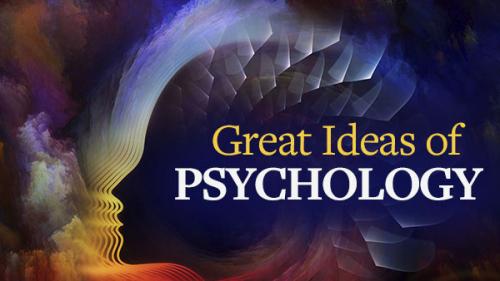TheGreatCoursesPlus - The Great Ideas of Psychology
Get a complete overview of the exciting field of psychology in this comprehensive course that explains the fascinating debates over the continuing mysteries of the mind.
1: Defining the Subject
- Is psychology really science at all? A look at the controversy that has engulfed psychology for centuries.
2: Ancient Foundations-Greek Philosophers and Physicians
- The ancient philosophers-in wrestling with the problems of knowledge, good and evil, governance, and how mankind should live-lay the foundations for the discipline of psychology.
3: Minds Possessed-Witchery and the Search for Explanations
- A look at how abnormal conduct-whether considered insanity or the act of a "witch"-has attracted society's special attention, sometimes with horrifying consequences.
4: The Emergence of Modern Science-Locke's "Newtonian" Theory of Mind
- A new emphasis on experimental investigation produces great achievements in natural science and technology, as well as insistent questions about whether the same methods can explain the workings of the mind and society.
5: Three Enduring "Isms"-Empiricism, Rationalism, Materialism
- An examination of the great debate over how knowledge and belief come to be and what this means for the definition of psychology.
6: Sensation and Perception
- An introduction to the methods by which sensation and perception are investigated and measure, including an introduction to the science and psychophysics.
7: The Visual Process
- One of the more scientific sides of experimental psychology is revealed in this look at the discipline's most studied and best known system-a true miracle of organization and function.
8: Hearing
- A look at another of the body's most acute senses-and the threats posed to this complex and delicate system by the constant auditory assault of 20th-century industrial and urban life.
9: Signal-Detection Theory
- The more difficult a discrimination or detection task is, the harder it is to measure. A look at how signal-detection theory is providing answers, especially in the particularly difficult area of measuring perception.
10: Perceptual Constancies and Illusions
- Can we really trust our senses? A surprising look at how knowledge and perception work together.
11: Learning and Memory: Associationism-Aristotle to Ebbinghaus
- A first look at the fascinating area of memory and how it works, including an introduction to the use of "mnemonics."
12: Pavlov and the Conditioned Reflex
- The famous "salivating dog" experiments were a harbinger of the behaviorist era to come but went well beyond what we learned about in school.
13: Watson and American Behaviorism
- An impatient crusader casts his vote for a pragmatic and scientific psychology confined to observable behavior.
14: B.F. Skinner and Modern Behaviorism
- A first look at one of the most influential and controversial psychologists of our time and his theory of conditioning human response.
15: B.F. Skinner and the Engineering of Society
- Skinner's theories as the model for completely changing child-rearing, education, behavior, and ultimately, society itself.
16: Language
- Skinner publishes his theory of language and the resulting critique, led by the then-unknown Noam Chomsky, points the way toward a more "cognitive" interpretation of psychology.
17: The Integration of Experience
- For most developed species, survival requires more than passive absorption of disconnected stimuli. An examination of how experience is organized to help creatures actually live.
18: Perception and Attention
- If perception weren't selective, we would drown in an unending flood of stimuli. A look at how we filter the input from the outside world down to what is important.
19: Cognitive "Maps," "Insight," and Animal Minds
- Is man the only animal that can think? A fascinating glimpse of both sides of the argument over anthropomorphic explanations suggest a surprising answer.
20: Memory Revisited-Mnemonics and Context
- A return to the subject of memory for a deeper discussion of how we process, store, and recover experience, including the problem of "eyewitness" testimony and reconstructed memories.
21: Piaget's Stage Theory of Cognitive Development
- A search for an explanation of how our mental powers are formed leads to the influential work of Jean Piaget and his theories of cognitive development in children.
22: The Development of Moral Reasoning
- Is moral development different from cognitive development as a whole? An examination of what we know about how moral reasoning evolves.
23: Knowledge, Thinking, and Understanding
- How we solve problems-how we actually function in our daily lives-including the essential psychological short-cut that makes the process possible.
24: Comprehanding the World of Experience-Cognition Summarized
- A summary of the finding that laid the foundation for the "cognitive revolution's" alternative to the empiricistic psychologies favored by the behaviorist school.
25: Psychobiology-Nineteenth-Century Foundations
- What is the relationship between physical and mental processes? A look at how researches have answered the question, including the strange system of phrenology and its role in the foundation of modern "brain science."
26: Language and the Brain
- Injuries to the brain-and resulting functional deficits-have taught us a great deal about brain function and organization, especially regarding the way language is processed.
27: Rationality, Problem-Solving, and Brain Function
- A continuing examination of the workings of the brain, including the organ's remarkable ability to compensate for damage early in development.
28: The "Emotional" Brain-The Limbic System
- Pleasure. Pain. Motivation. Rage. Fear. What we know about the fascinating part of the brain associated with these and other emotional states.
29: Violence and the Brain
- Is criminality really a pathology better understood in scientific than in moral terms? Is insanity truly a defense?
30: Psychopathology-The Medical Model
- Is all psychopathology, all "mental" illness, ultimately the consequence of a medical or biological disturbance? A look at this viewpoint and the criticisms it has faced.
31: Artificial Intelligence and the Neurocognitive Revolution
- Yes, computer programs can now contend with world-class chess players-to a point. But can computers be made to actually think? A beginning discussion of the pros and cons, along with the staggering ethical implications.
32: Is Artificial Intelligence "Intelligent"?
- Do the proponents of artificial intelligence understand what "intelligence" really is? Many say no.
33: What Makes an Event "Social"?
- Why a purely scientific examination of events involving people is impossible-and how researches have developed the kind of model necessary to interpret the meaning of these social events.
34: Socialization-Darwin and the "Natural History" Method
- How we examine a species within its own natural context, accounting for its defining features by matching these with the conditions faced by members of the species.
35: Freud's Debt to Darwin
- Darwin's works are among the most "well-worked-over" in Freud's restored London library. This lecture explores the influence of the world's most famous naturalist on its most famous psychiatrist.
36: Freud, Breuer, and the Theory of Repression
- Hysterical symptoms are unlike those produced by genuine neurological disorders. This lecture discusses the discovery of the "talking cure" and how it led to Freud and Breuer's theory of repression.
37: Freud's Theory of Psychosexual Development
- Freud's explanation of psychosexual development as the individual's progression from infantile stages of sexual gratification-such as thumb-sucking-to adult heterosexual activity.
38: Critiques of Freudian Theory
- Freud believed that psychodynamic processes are universal and largely independent of culture and society, but his biological interpretation has been rejected in favor of socially and culturally oriented theories.
39: What Is "Personality"?
- The question has still not been answered definitively and has furnished the grist for many since-refuted theories. This lecture examines the debate.
40: Obedience and Conformity
- Several classic experiments have shown the powerful influence of social context on conduct and have offered a strong challenge to both the dominant theories of personality.
41: Altruism
- Why do some people act heroically? Once again, social context proves critical in determining human behavior, though a highly developed self-perception can help a person rise above the common in unlikely circumstances.
42: Prejudice and Self-Deception
- Acts of prejudice call for a reinterpretation of context and even a reinterpretation of self to justify the action. An exploration of the darker side of human behavior.
43: On Being Sane in Insane Places
- What is sanity? What is insanity? As a chilling study demonstrates, the answers often depend on who is controlling the labels.
44: Intelligence
- The history of I.Q. and other so-called "intelligence" tests offer valuable lessons in what is and is not "predictable."
45: Personality Traits and the Problem of Assessment
- Is there really a test that can reveal the "underlying personality" of an individual? A look at the fundamental problem of devising such a measuring stick.
46: Genetic Psychology and "The Bell Curve"
- The issue of whether a given trait is rooted in genetics or the environment-long a controversial issues in the public arena-is when predicting the potential of an individual.
47: Psychological and Biological Determinism
- An exploration of the notion of determinism reveals it to be both counterintuitive and, in some respects, self-refuting.
48: Civic Development-Psychology, the Person, and the Polis
- In many ways, the fullest and most systematic theories of psychology are still those provided by Aristotle. An exploration of how rational creatures can flourish when the biological, social, and political are truly integrated.

The.Great.Ideas.of.Psychology.part1.GC.rar
The.Great.Ideas.of.Psychology.part2.GC.rar
The.Great.Ideas.of.Psychology.part3.GC.rar
The.Great.Ideas.of.Psychology.part4.GC.rar

































